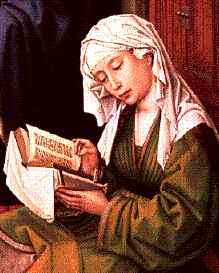The education of girls
Except among daughters of the nobility, and among the Puritans, formal schooling for girls was not encouraged. For those who were educated, subjects focused mainly on encouraging chastity and developing skills of housewifery.
A girl had to learn how to govern a household, and how to conduct herself in the social class into which her marriage would place her. (She would assume the status of her husband, whether it was above or below her own.) By the mid sixteenth century, some girls were permitted to attend grammar school with their brothers, and later, thanks to those protestants who envied the education obtained in nunneries in Europe, private schools were established for those young ladies whose families could afford the expense.
"Womanly accomplishments"
Young girls of the wealthy--like their brothers--were often placed by their families in the household of a friend or acquaintance: there they would learn to read, write, keep accounts, manage a household and estate, make salves and practice surgery. (These skills are explored in the section on the housewife.) The learning of social skills such as singing and dancing was also important. However, as universities would not admit women, the future for most girls involved marriage, children, and household duties.
What options were there for women after they completed their education?
The Medieval Feminist Index lists scholarship on women, sexuality, and gender.
